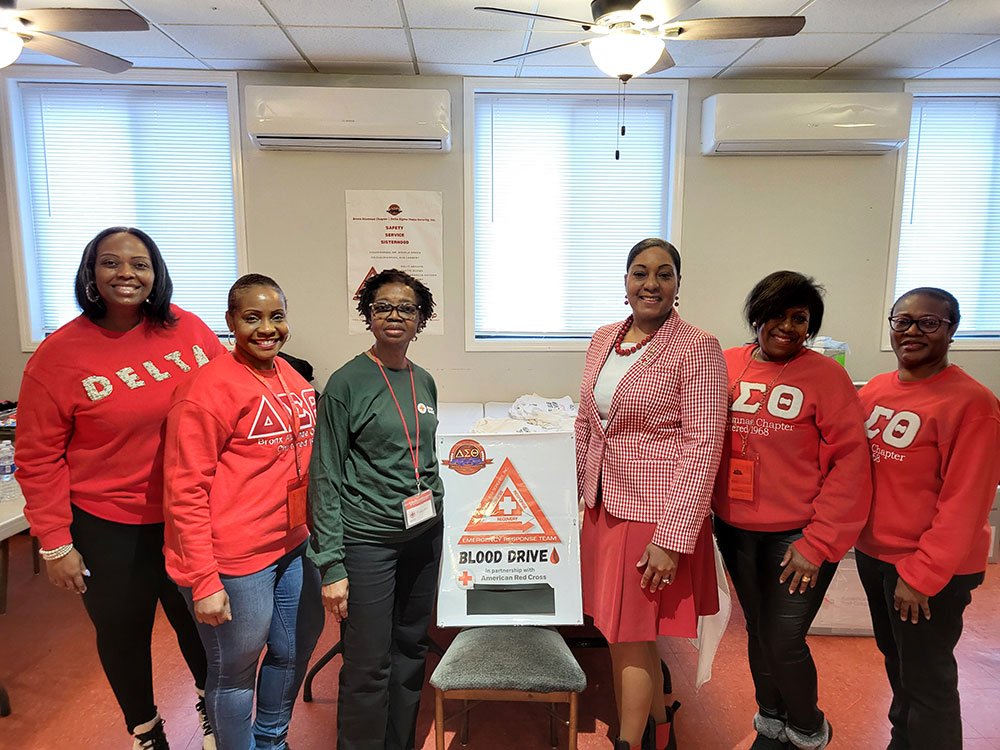
The members of the Bronx Alumnae Chapter of Delta Sigma Theta Sorority, Inc. stand alongside the Red Cross Blood Donor Ambassador volunteer (green) during their blood drive held on January 26, 2024, at the Redwood Club in the Bronx. Pictured, left to right: Sara Davis, Ava Lambert, Marian Ford, Jennifer Lackard, Dr. Angela Green, and Janice Bellamy Hemby.
Photo by Frederic Klein / American Red Cross
by Frederic Klein
A mix of pop music and R&B plays through a stereo. The hum of blood collection machinery whirs in the background. Energy is high at the Redwood Club, as the members of the Bronx Alumnae Chapter of Delta Sigma Theta Sorority, Inc. carefully lay out the t-shirts to be given to everyone who showed up to donate blood — the words, “Be A Sickle Cell Fighter” emblazoned on the front.
Delta Sigma Theta Sorority, Inc. is a national service organization of college-educated women focused on programs that assist the African American community throughout the world. Among their 1,000 collegiate and alumnae chapters is the Bronx Alumnae Chapter (BxAC). Dr. Angela Green serves as the chair of their Emergency Response Taskforce Committee (ERT).
The committee focuses on preparing chapter members and the community with the skills to be ready in an emergency or disaster. The need for blood is constant, but the demand is often higher for types O and B blood, which is more common among African American and Latino populations. Understanding the need for blood donations in the African American community, the ERT leapt into action with urgency. They set a target of hosting three blood drives per year in the Bronx, including the blood drive at the Redwood Club held in late January 2024.
“We want to make sure our community has what it needs to survive,” said Dr. Green. “I had a blood transfusion years ago and needed blood, so I make sure to donate myself. Most importantly, we know that when there’s an emergency, like there’s an accident or when someone loses a lot of blood, we want to make sure that patients and hospitals have access [to blood products].”
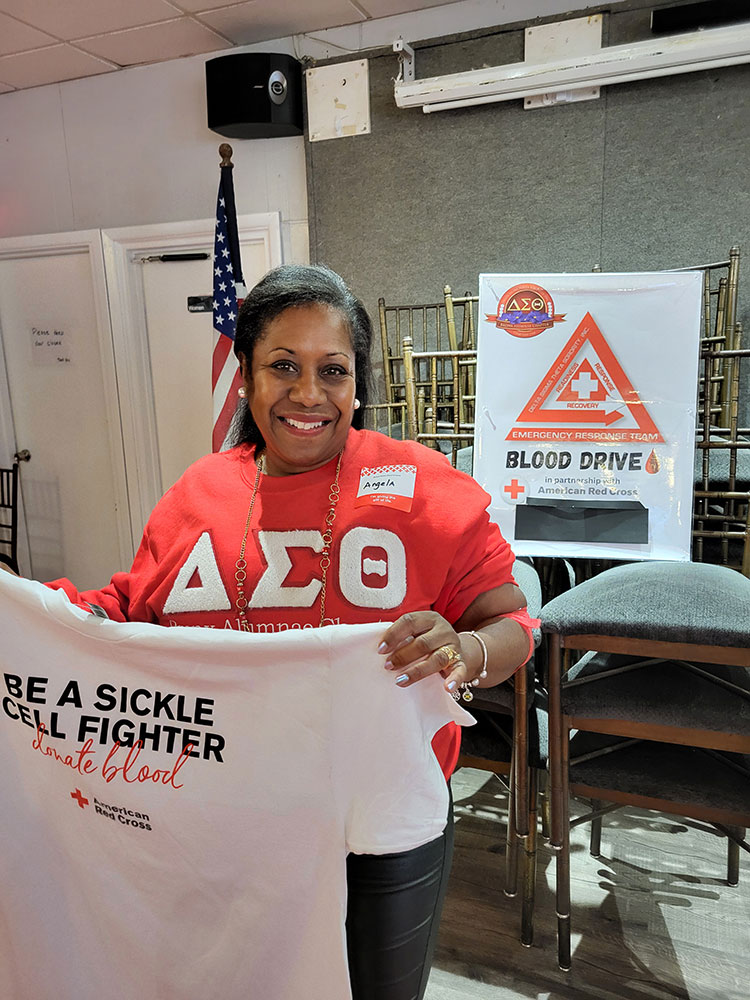
Dr. Angela Green, chair of the Emergency Response Taskforce Committee of the Bronx Alumnae Chapter of Delta Sigma Theta Sorority Inc., after donating blood at their blood drive with the Red Cross in January 2024.
Photo by Frederic Klein / American Red Cross
Every two seconds, someone in the United States needs blood and platelets, including accident and burn victims, heart surgery and organ transplant patients, new moms, premature babies, and those receiving treatment for leukemia, cancer, or sickle cell disease.
Marian Ford, a dedicated volunteer Blood Donor Ambassador for the Red Cross based in the Bronx, supported the blood drive hosted by BxAC at the Redwood Club. She said she is driven to volunteer because of what she has learned about sickle cell disease.
“I never really thought about [donating blood] too much and I knew people that had sickle cell but [I didn’t think about] what it entailed and how much blood was needed for that,” said Marian. “So now I’ve become almost an ambassador for sickle cell because every time anyone mentions to me about sickle cell, I always ask ‘Are you a blood donor? Because your blood is necessary for that person’”.
Sickle cell disease causes distortions in red blood cells, resulting in hard and crescent shaped blood cells instead of soft and round-shaped cells. This deformation not only reduces the ability of the circulatory system to bring oxygen where it is needed in the body, but it also causes the distorted blood cells to get stuck – something which often causes extreme pain and necessitates a blood transfusion to alleviate the symptoms. Although medical research is making progress on permanent treatments for sickle cell disease, the most accessible and important treatment method is blood transfusion. A sickle cell patient can require up to 100 units of blood each year for their treatments.
Though people from all races and ethnicities are encouraged to donate blood to help ensure the right blood product is available for those in need, a patient is more likely to find a compatible blood match from a donor of a similar race or ethnicity. Blood type, like eye color, is an inherited trait passed genetically from parents. About half of African Americans and more than half of all Latinos in the United States have type O blood, and sickle cell disease occurs in 1 in 365 Black or African American births and 1 in 16,300 Latino births in the United States. Meanwhile, one in three African American blood donors are a match for people with sickle cell disease.
Jennifer Lackard is a member of the ERT and serves as the point of contact between the BxAC and the Red Cross to host blood drives. The blood drive in January was undeniably a success – collecting 25 units (exceeding their goal by 67%) and recruiting 10 first-time blood donors to the drive.
“I’ve been hosting blood drives with the American Red Cross for several years now,” said Jennifer. “Not only is it one of the simplest acts of kindness that one can offer, but it’s also incredibly rewarding to host blood drives in minority communities where the demand is so high.”
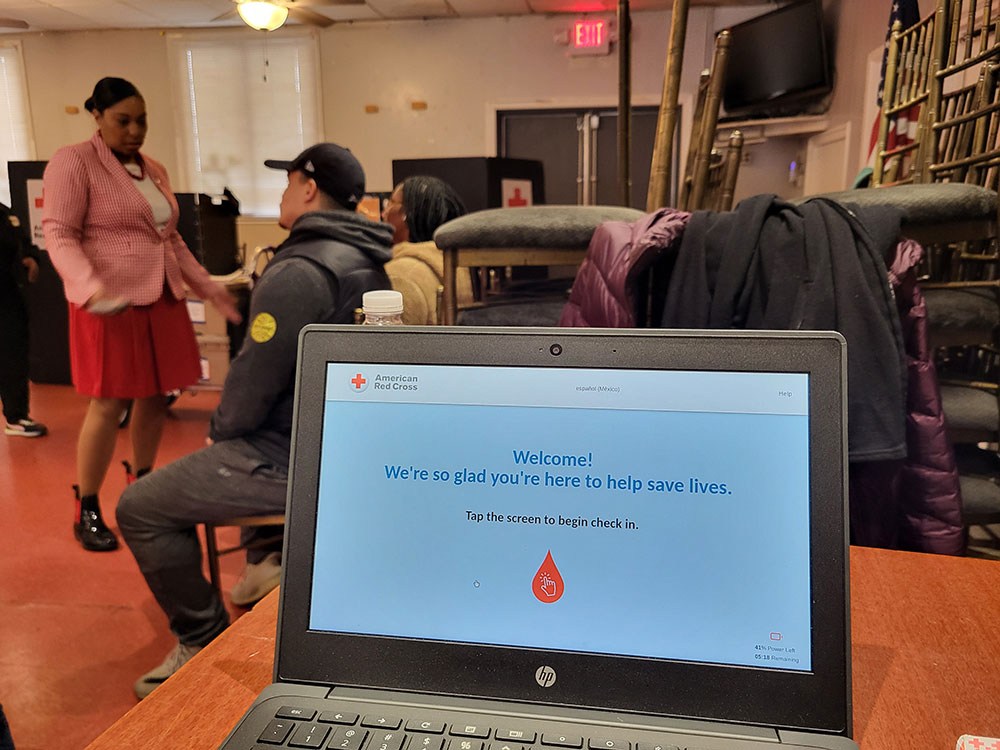
Bronx Alumnae Chapter member Jennifer Lackard talks with a blood donor at the Redwood Club in the Throgs Neck section of the Bronx.
Photo by Frederic Klein / American Red Cross
Zoriah Ashby made her second ever blood donation at the BxAC blood drive and Aisha Sutton came to donate in honor of her mother.
“I had seen it on Instagram, and so I wanted to come and donate since I didn’t get to do it a few months ago,” said Zoriah. “It’s a pretty simple process."
“I’m donating blood because my mother is a colon cancer survivor,” said Aisha. “[People who are nervous about donating] should consider their loved ones.”
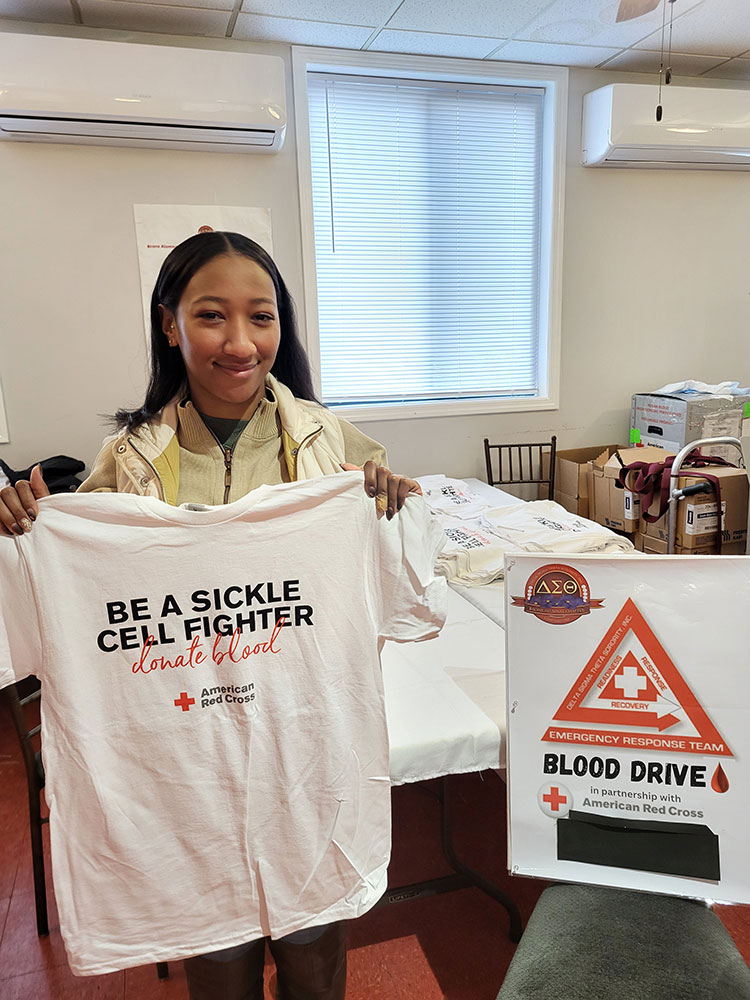
Zoriah Ashby, a second-time blood donor, stands with her t-shirt after donating blood in the Bronx.
Photo by Frederic Klein / American Red Cross
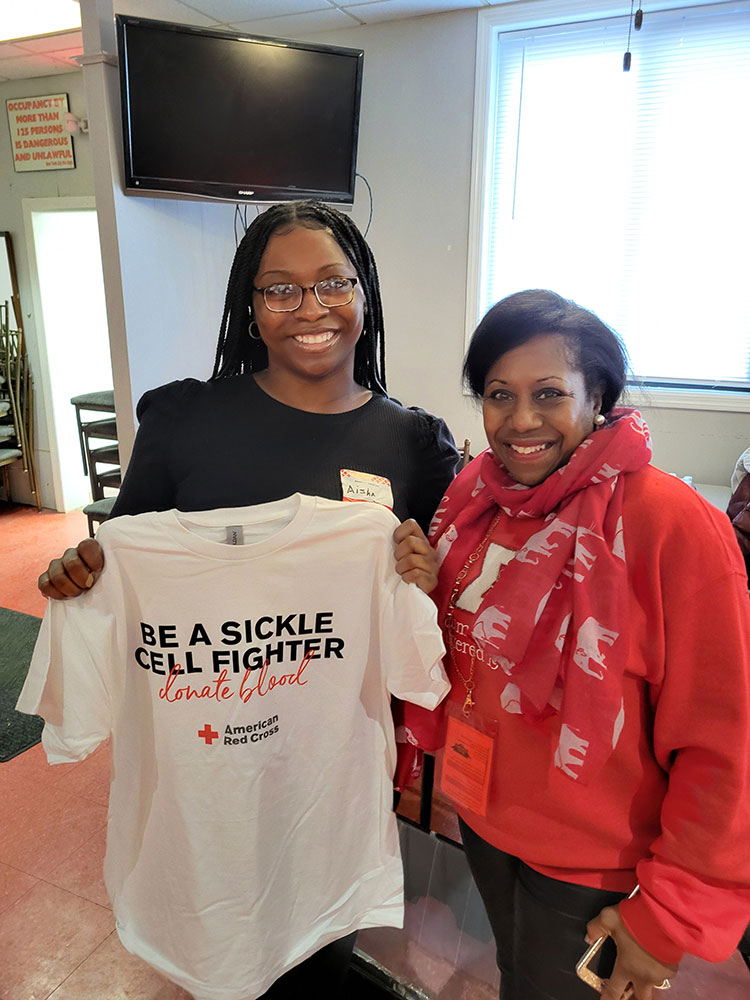
Aisha Sutton poses with Dr. Angela Green after donating blood at the drive organized by the Bronx Alumnae Chapter of Delta Sigma Theta Sorority, Inc.
Photo by Frederic Klein / American Red Cross
With every donor that came to donate, the members of BxAC were quick to offer a t-shirt and a snack, and to thank them for giving the gift of life. Their enthusiasm was even more pronounced when Dr. Green made her donation, snapping discreet pictures and selfies with her while she was making her donation.
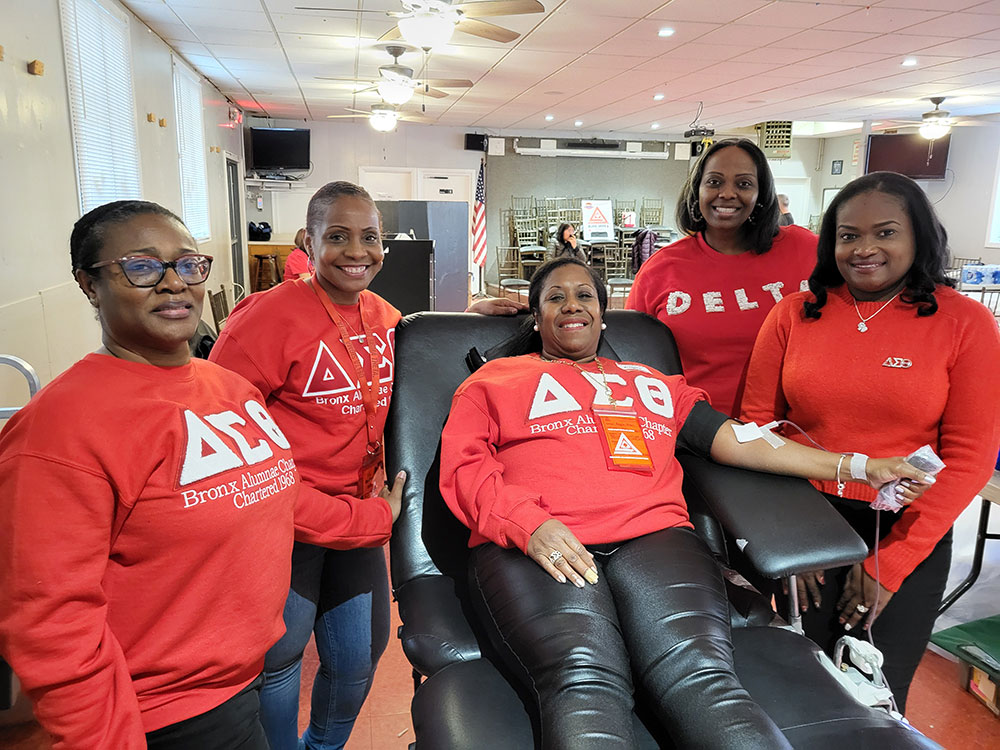
Dr. Angela Green sits on the donation bed while her blood is collected, surrounded by her sisters from the Bronx Alumnae Chapter of Delta Sigma Theta Sorority, Inc. Pictured, left to right: Janice Bellamy Hemby, Ava Lambert, Dr. Angela Green, Sara Davis, and Dr. Tanicia Rivera, President of the Bronx Alumnae Chapter of Delta Sigma Theta Sorority, Inc.
Photo by Frederic Klein / American Red Cross
“United in our mission to save lives through the power of blood donation, we are thrilled to unveil our enduring partnership with the American Red Cross,” said Dr. Tanicia Rivera, President of the Bronx Alumnae Chapter of Delta Sigma Theta Sorority, Inc. “As fervent champions of public health, we recognize the paramount significance of blood donation and the pivotal role of blood drives. Each donation serves as a vital lifeline for individuals in crisis, offering them hope and healing amidst medical emergencies, surgeries, and chronic illnesses. Together, let's persist in our commitment to this noble tradition, guaranteeing a steadfast blood supply for our communities and nurturing a culture defined by compassion and solidarity.”
As the drive concluded, a team of phlebotomists meticulously packed each donation into insulated containers. These containers were then loaded into a Red Cross van, where they were then sent for testing, storage, and distribution to areas in need. Meanwhile, the members of BxAC eagerly discussed their upcoming blood drive — just a few months away.
Step up to host a blood drive. A host will provide a suitable location, publicize the blood drive, organize a recruitment committee to recruit donors, and schedule donors for appointments. For more information, visit www.redcrossblood.org/host.
Support all the urgent humanitarian needs of the American Red Cross.
Find a drive and schedule a blood donation appointment today.
Your time and talent can make a real difference in people’s lives. Discover the role that's right for you and join us today!